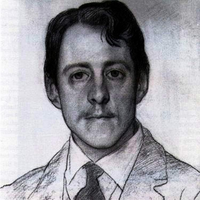The Dryad
What has the ilex heard,
What has the laurel seen,
That the pale edges of their leaves are stirred?
What spirit stole between?
O trees upon your circle of smooth green,
You stir as youths when beauty paces by,
Moving heart and eye
To unuttered praise.
Was it the wind that parted your light boughs,
Some odour to recapture as he strays,
Or some fair virgin shape of human brows
Yet lost to human gaze?
O for that morning of the simple world,
When hollow oak and fount and flowering reed
Were storied each with glimpses of a face
By dropping hair dew—pearled!
Strange eyes that had no heed
Of men, and bodies shy with the firm grace
Of young fawns flying, yet of human kin,
Whose hand might lead us, could we only spare
Doubt and suspicious pride, a world to win,
Where all that lives would speak with us, now dumb
For fear of us. O might I yet win there!
Wave, boughs, aside! to your fresh glooms I come.
But all is lonely here!
Yet lonelier is the glade
Than the wood’s entrance, and more dark appear
The hollows of still shade.
Ah, yet the nymph’s white feet have surely stayed
Beside the spring; how solitary fair
Shines and trembles there
White narcissus bloom!
By lichened gray stones, where the glancing stream
Swerves over into green wet mossy gloom,
Their snowy frail flames on the ripple gleam
And all the place illume.
Surely her feet a moment rested here!
Staying her hand upon a pliant branch,
She paused, she listened, and then glided on
Half—turned in lovely fear;
And her young shoulder shone
Like moonbeams that wet sands, foam—bordered, blanch,
A sight to stay the beating of the breast!
Alas, but mortal eyes may never know
That beauty. Hark, what bird above his nest
So rapturously sings? Ah, thou wilt tell,
Thou perfect flower, whither her footsteps go,
And all her thoughts, pure flower, for thou know’st well.
White sweetness, richest odours round thee cling.
Purely thou breathest of voluptuous Spring!
Thou art so white, because thou dost enclose
All the advancing splendours of the year;
And thou hast burned beyond the reddest rose,
To shine so keenly clear.
Shadowed within thy radiance I divine
Frail coral tinges of the anemone,
Dim blue that clouds upon the columbine,
And wallflower’s glow as of old, fragrant wine,
And the first tulip’s sanguine clarity,
And pansy’s midnight—purple of sole star!
All these that wander far
From thee, and wilder glories would assume,
Ev’n the proud peony of drooping plume,
Robed like a queen in Tyre,
All to thy lost intensity aspire;
Toward thee they yearn out of encroaching gloom;
They are all faltering beams of thy most perfect fire!
And she, that only haunts remote green ways,
Is it an empty freedom she doth praise?
Doth she, distrustfully averse, despise
The common sweet of passion, apt to fault?
And turns she from the hunger in love’s eyes
Pale famine to exalt?
Oh no, her bosom’s maiden hope is still
A morning dewdrop, imaging complete
All life, full—stored with every generous thrill;
No hope less perfect could her body fill,
Nor she be false to her own heart’s rich beat.
But she is pure because she hath not soiled
Hope with endeavour foiled;
She not condemns glad love, but with the best
Enshrines it, lovelier because unpossest.
Where is the joy we meant
In our first love, the joy so swiftly spent?
It glows for ever in her sacred breast,
Untamed to languor’s ebb, nor by hot passion rent.
O pure abstaining Priestess of delight,
That treasurest apart love’s sanctity,
Art thou but vision of an antique dream,
Mated with a song’s flight,
With beckoning western gleam
Or first rose fading from an early sky?
Yet we, that are of earth, must seek on earth
Our bodied bliss. Nay, thou hast still thine hour;
And in a girl’s life—trusting April mirth,
Or noble boy’s clear and victorious eyes,
Thou shinest with the charm and with the power
Of all that wisdom loses to be wise.

